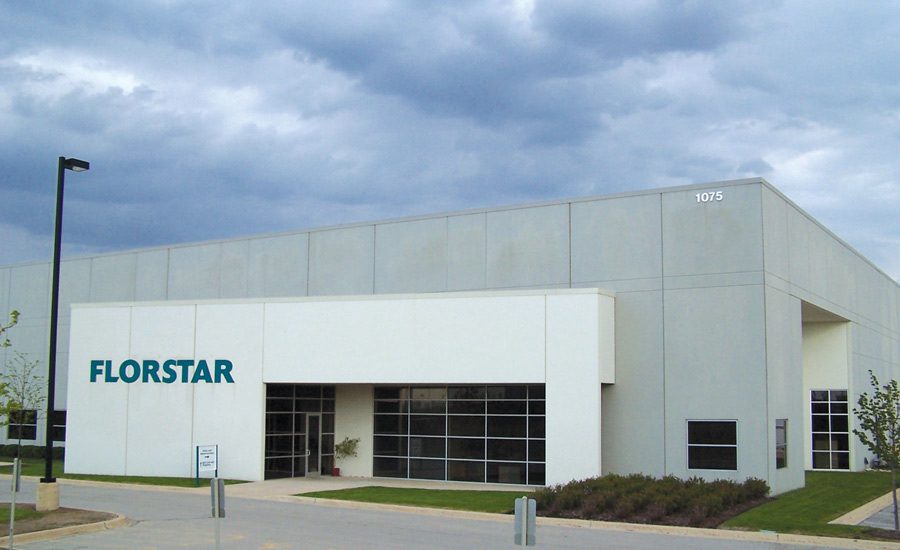FlorStar Celebrates 30 Years






This year, FlorStar is proud to celebrate 30 years of business. The company has grown and changed with the times and our industry, resulting in the transformation from a flooring distributor to a multifaceted flooring solutions company. Floor Trends sat down with FlorStar President Scott Rozmus to learn how the company has expanded its capabilities, product and service offerings and technologies through the last three decades to become an industry powerhouse.
FT: How has FlorStar grown through the years to be what it is today?
SR: FlorStar’s roots date back to the 19th century as the firm grew out of the wholesale floor covering division of the retailer Carson Pirie Scott & Co. In the 1980s Carson’s chose to exit wholesale floor covering distribution and spun FlorStar off to a management team. Our current owner was a lead member of the team. FlorStar always has been headquartered in the Chicagoland area, but the firm has moved its main warehouse and office location over the years as the business evolved and grew. Today, we are headquartered in Romeoville, Ill., and provide service for customers across the U.S., with the majority of our focus occurring in a 10-state region in the Midwest.
FT: What exactly does it mean to be a flooring solutions company?
SR: As a “flooring solutions” company, our focus goes beyond the top-of-floor product, for which we offer clients a gamut of choices in all varieties of hard surface and soft surface, exceeding 10,000 total SKUs. However, we go further in providing an array of technical and logistical services, as well as all of the floor preparation materials clients require to ensure high-quality installation. We work on a proactive and consultative basis with our clients to identify potential issues before they become problems that delay or adversely impact a job and offer alternatives to limit risk of failure, work with job-site limitations, and so forth.
FT: What have been some of the company’s challenges?
SR: We’ve faced various challenges over the past three decades as an independent firm. Initially, the company was heavily, heavily leveraged. The debt load created a great deal of direct and indirect stress on the business, but fortunately the vision of the initial ownership and management team became a reality—FlorStar simultaneously was able to eliminate waste, increase service, and grow sales. Later in our existence, FlorStar made the decision to cease stocking and cutting broadloom carpet locally in order to focus more resources on the growing hard surface business. That strategy resulted in the company spinning off its large carpet division, which created some uncertainty and risk regarding the remaining divisions’ ability to grow profitably to fill the void. However, opportunities with key vendor partners, such as Armstrong Flooring, provided growth in hard surface product categories that more than filled the gap.
FT: How is FlorStar changing with the times?
SR: We’re always searching for meaningful ways to employ technology in our business. Almost 20 years ago, we were a pioneer in using wire-guided turret vehicles in floor covering logistics. Even before that, back in the 1980s, we were among the first in our industry to incorporate a voicemail system. Today, we continue to invest in technologies to increase to mobility and efficiency of our sales force as well as to efficiencies in order entry, marketing and logistics.
FT: Tell us about I-Focus. What is it, and what are the benefits of it on the business and consumer side?
SR: I-Focus is an order entry and informational research portal for our clients. It allows our dealers and contractors 24-hour, 365-day access to view, reserve, and order inventory as well as to research past orders. Through this secure, password protected resource, our customers can access immediate, real-time information whenever they desire. In turn, I-Focus allows our clients to close more business and to do so on their schedule. The efficiencies are tremendous.
FT: What does the future of distribution look like?
SR: Distribution will remain a viable part of the industry. Consolidation will continue, resulting in larger and larger mega-regional or even national players. Such scale is needed over time to address the ongoing compression of margins due to increased competition coupled with ongoing increases in key input costs, such as health care. At the same time as this consolidation is occurring, smaller, nimble niche players likewise will remain quite viable. Whether it is a firm servicing a particular community or focusing upon a particular area, any entity able to bring significant expertise to bear upon problems or needs will survive and thrive. As our population continues to evolve into an older group in need of particular services, the opportunity for localized, catered-to-the-individual services may never have been higher.
FT: How are you reaching the next generation of customers?
SR: We work with vendor partners to disseminate our marketing messaging across a variety of meaningful social media platforms. We try our best to listen to our customers regarding their needs, in terms of tools, sampling vehicles and other sales and service options, and then to customize solutions for these needs, even on an individualized basis.
Looking for a reprint of this article?
From high-res PDFs to custom plaques, order your copy today!













